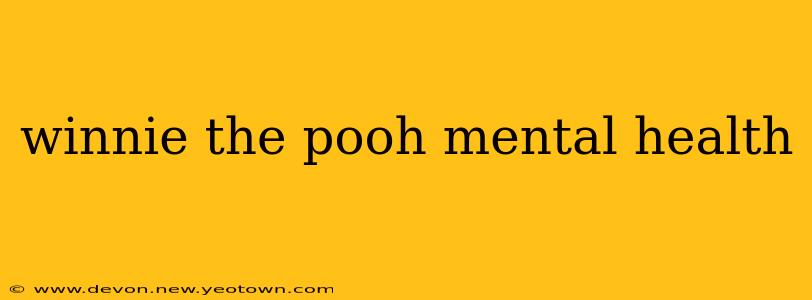Winnie-the-Pooh, the beloved bear of A.A. Milne's creation, might seem like a simple children's character, but his adventures in the Hundred Acre Wood hold a surprising depth of relatable experiences, offering valuable insights into various aspects of mental health. Beyond the honey and playful antics, Pooh's world reflects common emotional struggles, making him a surprisingly insightful companion for exploring mental well-being. This isn't about diagnosing Pooh or his friends, but about using his stories to understand and discuss important mental health concepts in an accessible way.
How Does Winnie-the-Pooh Deal with His Worries?
Pooh, despite his generally optimistic nature, experiences moments of anxiety and worry. His anxieties are often centered around food – specifically honey – and his fear of running out. This resonates with many who struggle with anxieties around resources or security. Pooh's coping mechanisms, while not always the most effective, are relatable. He often seeks comfort in his friends, highlighting the importance of social support in managing difficult emotions. His simple, almost childlike approach to problem-solving can also teach us the importance of approaching our anxieties with a sense of gentle curiosity, rather than immediate panic.
Is Piglet Depressed? Understanding Anxiety and Low Self-Esteem in Winnie-the-Pooh
Piglet, Pooh's timid and often anxious friend, embodies the struggles of anxiety and low self-esteem. His constant fear and self-doubt are palpable. He often minimizes his own contributions and dwells on negative self-perceptions. However, his bravery in moments of crisis reveals a strength often hidden beneath his anxieties. Piglet's journey shows that even those struggling with significant mental health challenges possess inner resilience. His experiences encourage us to acknowledge and validate the feelings of those battling anxiety and low self-esteem, reminding us that strength can exist alongside vulnerability.
Eeyore's Pessimism: Exploring Symptoms of Depression
Eeyore, the perpetually gloomy donkey, is often cited as a representation of depression. His consistent negativity, hopelessness, and lack of motivation are hallmarks of depressive symptoms. While Eeyore's pessimism is often played for comedic effect, it also provides an opportunity to discuss the complexities of depression in a gentle way. His interactions with his friends, even when met with frustration, demonstrate the importance of continued support and patience when dealing with someone struggling with depression. His story underscores the significance of understanding and reaching out to those who may appear withdrawn or uninterested in interaction.
Does Tigger Have ADHD? Exploring Hyperactivity and Impulsivity
Tigger's boundless energy, impulsivity, and difficulty focusing could be interpreted as mirroring characteristics of ADHD (Attention Deficit Hyperactivity Disorder). His constant bouncing, interrupting, and impulsive actions highlight some of the challenges faced by those with ADHD. While it's important to remember that fictional characters aren't diagnoses, Tigger's behavior can spark conversations about the complexities of neurodivergence and the importance of acceptance and understanding. His exuberant nature, although sometimes disruptive, also shows that individuals with ADHD can bring unique energy and perspective to the world.
Can Understanding Winnie-the-Pooh Help with Mental Health?
The characters in Winnie-the-Pooh, with their diverse personalities and relatable struggles, offer a unique lens through which to examine various aspects of mental health. Their simple stories provide a safe and accessible entry point for engaging with complex topics, promoting understanding and empathy. While not a replacement for professional help, the Hundred Acre Wood offers a comforting space to start conversations, explore common struggles, and consider the importance of friendship, self-acceptance, and seeking support when needed. The enduring popularity of Winnie-the-Pooh highlights the timeless appeal of relatable characters and stories that gently encourage self-reflection and understanding of the human experience.

